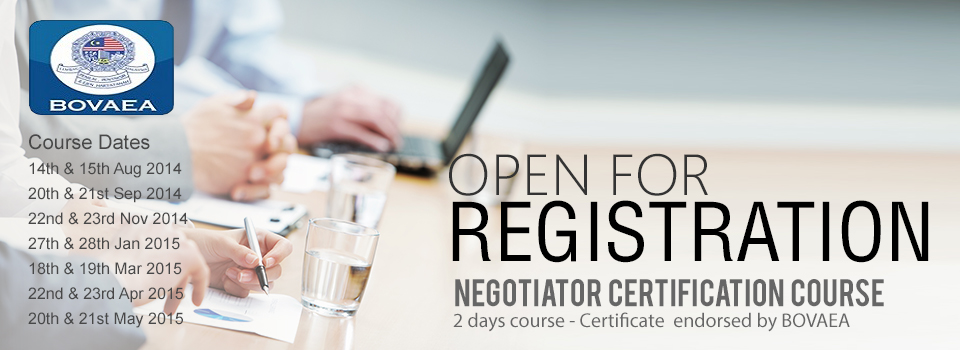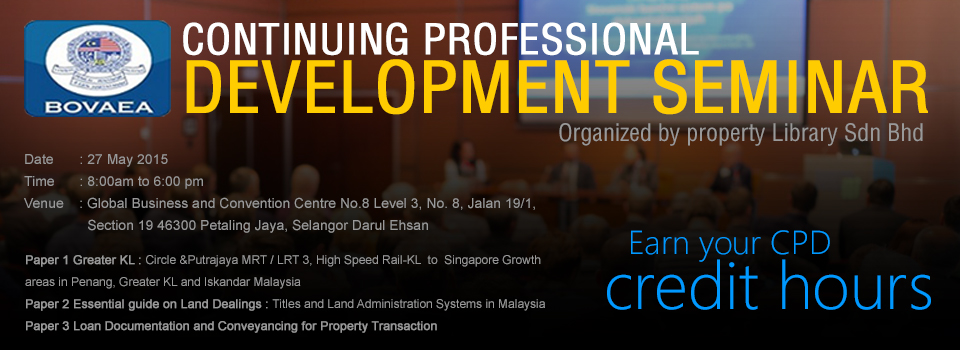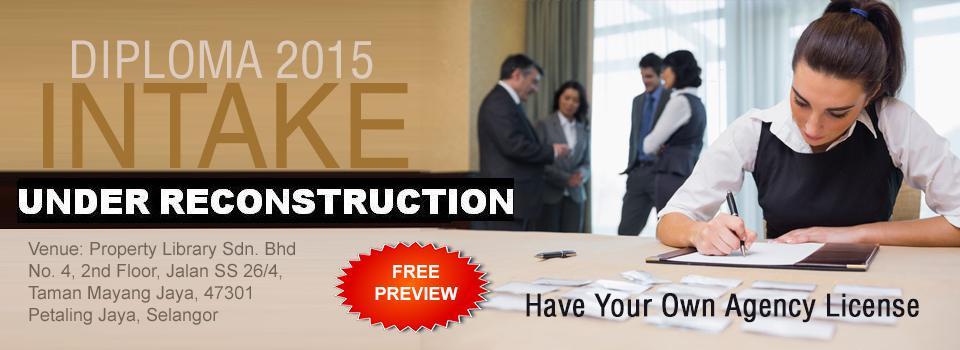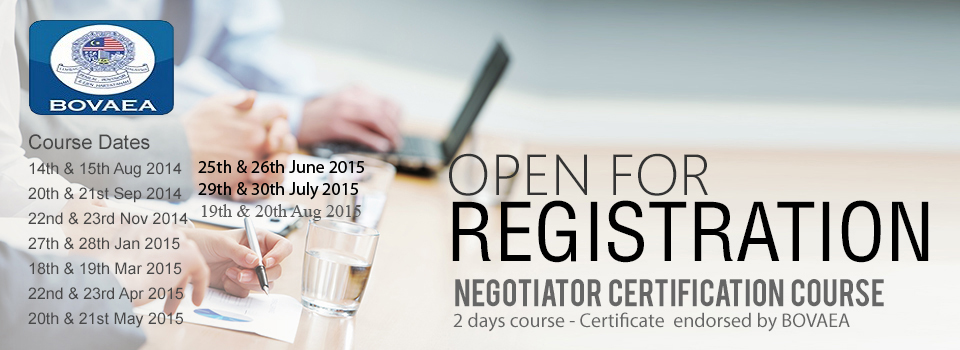Welcome to PROPERTY LIBRARY
We conduct the Diploma in Real Estate course and prepare you for the examinationby the Board of Valuers, Appraisers and Estate Agents to enable you to eventually obtain your practisingReal Estate Licence. After passing all the subjects in the BOVAEA’s examination, you are qualified to take the Test of Professional Competence (TPC) to become a Registered Estate Agent. Our course is delivered by a diverse range of experienced practitioners and trainers, and provides you with an opportunity to ask questions and gain knowledge from industry experts. Join us to study to become a future registered estate agent and property tycoon. Both full and part time courses are available for enrollment now.
Rules & Guidelines
INTRODUCTION
Professional real estate agency practice was
introduced into then Malaya by the British during the British colonial governance
when Malaya, Sabah and Sarawak were colonies of Great Britain. As with other professions, the colonial
government brought along the existing professional real estate agency system
practiced in UK to Malaya when they governed the colonial territories. Real estate agency in UK was practiced as
part of the full-fledged services of property consultancy (general practice
surveying) firms which offered estate agency, valuation, property consultancy,
research and property management services. The principals of these property
consultancy firms were mainly general practice surveyor members of the Royal
Institution of Chartered Surveyors, UK (RICS) in the General Practice Division
while others were members of other professional bodies providing similar full-fledged
services.
Members of the Royal Institution of Chartered Surveyors, UK who came to Malaya before independence in 1957 were the first professional practitioners of real estate agency in Malaya. They were the first practitioners who were members of a professional body (RICS) which had qualification requirements for membership, standards, rules, regulations and code of ethics that were binding upon these practitioners. The professional body also had stringent academic examination and professional qualification requirements for entry as members. Members of the RICS, UK (Federation of Malaya branch) subsequently formed the Malayan Institution of Surveyors (MIS). Members in the General Practice Division of the MIS practiced professional real estate agency as part of their full fledged property consultancy services.
On 13th March, 1961 the MIS (former RICS Federation of Malaya branch) and the Institution of Land Surveyors which met at the boardroom of the Royal Selangor Club made the historic decision to merge and form the then Institution of Surveyors (Federation of Malaya). This institution was the first locally incorporated professional body of members in Malaya, Sabah and Sarawak whose members practiced real estate agency.
At the first inaugural general meeting on 2ndDecember, 1961 Mr. Khoo Soo Guan was elected President, Mr. W.G. Wicks the Vice President, Mr. Yap Thean Ee the Honorary Secretary and Mr. R.H. Norris the Honorary Treasurer as the first committee. At an EGM held on 19th June 1966, the name of the institution was changed to the Institution of Surveyors Malaysia. On 28th March 2011, the Institution on being conferred the royal charter by the HRH Sultan of Selangor was renamed the Royal Institution of Surveyors, Malaysia.
Both Mr. W.G. Wicks and Mr. Yap Thean Ee were among the pioneer practitioners of professional real estate agency in Malaysia. Other pioneer practitioners included John M. Carter and Colin Harold Williams. Amongst the early pioneer property consultancy firms providing professional estate agency services were Wicks & Partners, John Carter & Co, C H Williams & Co and Yap Thean Ee & Co.
The first registration of real estate practitioners after Independence were those general practice surveyors who were registered under the Registration of Surveyors Act 1967 together with the registration of quantity surveyors. In 1981 the Valuers and Appraisers Act catered separately for the registration of the general practice surveyors.
Subsequent to the establishment of the Institution of Surveyors Malaysia in 1961, two other bodies comprising professional practitioners of real estate namely PEPS and MIEA had also been set up.
While real estate agency was practiced professionally by the general practice surveyors (RISM) and members of PEPS and MIEA, there was a rising occurrence of illegal estate agents or estate agency being practiced by part time brokers without qualifications to the extent that such practices which were operated in the main, unprofessionally had become rampant. In 1984, the Ministry of Finance, to safeguard public interest, had to bring order to the sullied profession by roping in unregistered estate agents and putting them under the purview of the Board of Valuers, Appraisers and Estate Agents (BOVAE). The Board of Valuers, Appraisers and Estate Agents is the governing body responsible for licensing of estate agents and property consultancy professionals by imposing high standards of professionalism on real estate practitioners. The BOVAE also conducts examinations for qualifications leading to being a registered estate agent with the BOVAE.
ELIGIBILITY FOR ENTRY
- Part I: Candidates must show proof to the satisfaction of the Board that they possess not less than a Sijil Pelajaran Malaysia or its equivalent with not less than five subject passes of which at least three shall be credit level passes and at least one of the credit level passes shall be in Mathematics or Science or Accounts or Commerce.
- Part II : Candidates must show proof that they have passed PART I of the examination.
EXAMINATION
- The examinations will be held twice (2) a year.
- The application forms for the above examination are available at:
LEMBAGA PENILAI, PENTAKSIR DAN EJEN HARTATANAH MALAYSIA
A-27-15, Level 27, Tower A Menara UOA Bangsar
No. 5, Jalan Bangsar Utama 1 59000 Kuala Lumpur
Tel No. : 03-2288 8815/ 2288 8816 / 2288 8817
Fax No. : 03-2288 8819 - The date of the examinations shall be published in at least two local newspapers.
- Application forms duly completed must be submitted to the Board from 2nd January till 2nd May of that particular year or as specified by the Board from time to time.
- The subjects for the Part I examinations are:
i) Principles of Accounting
ii) Introduction to Law
iii) Principles of Economics
iv) Property Taxation
v) Principles and Practice of Marketing
vi) Building Technology I - The subjects for the Part II examination are:
i) Land Economics
ii) Estate Agency Law
iii) Principles of Valuation
iv) Laws Relating to Property
v) Real Estate Agency Practice
vi) Building Technology I - Each subject consists of seven (7) or eight (8) questions and candidates will be required to answer 4 questions from the former and 5 questions from the latter. The format of all the questions will be of a subjective nature and the same comprises of theoretical and problematic questions.
- The candidate may answer the questions in Bahasa Malaysia or English Language.
- The passing mark for each subject of the examination shall be 50%.
A candidate may take all or at least two of the six subjects in the respective part at one sitting and be given credits for the subjects passed which shall lapse at the end of the third year.
A pass in all the above six subjects in Part I makes the candidate eligible for Part II. Candidates must take the Part II examination not later than 5 years after passing all the subjects in Part I examination.
A pass in all the above six subjects in Part II makes the candidates eligible for the Test of Professional Competence.
RESULTS
- Immediately after the result of the examination has been decided by the Board, the Registrar will notify every candidate of the same.
- Any candidate dissatisfied with the marking of his answer papers may appeal to the Board within 1 month of notification of the results. The appeal should be submitted together with the fee of RM100.00 per subject (non refundable).
WITHDRAWING FROM THE EXAMINATION
- Candidates withdrawing from the examination at any time but not within 4 weeks before the said examination shall forfeit 50% of their fees.
- Candidates withdrawing within 4 weeks of the said Examination shall forfeit 100% of their fees.
- Candidates absenting themselves from the whole examination shall forfeit all their fees unless they can produce Medical Certificate certifying their illness which renders themselves incapable of sitting for the examination. In these cases, the refund of the fees is at the discretion of the Board.
- The examination fees so paid cannot be carried forward to a subsequent examination.
FEES
- The fees per subject is RM50.00 and the processing fee is RM50.00.
GENERAL INSTRUCTIONS
- Candidates are to conduct themselves properly at all times since the Examination Centre is made available through the courtesy of the authorities concerned.
- Candidates must bring alone their identity cards or other forms of identification at all times.
- Candidates will be supplied with the Board’s Examination pad for their Answer Scripts.
- Candidates should equip themselves with:- Pen, pencils, eraser, drawing instruments and calculators (non programmable).
- Each candidate will be assigned an index number which will be used throughout the examination.
- Candidates are, at the end of each paper, permitted to remove the question papers plans or drawing from the examination room provided answers are NOT required to be written on them.
- Smoking is NOT permitted in the Examination Hall.
- Candidates should be dressed properly. Candidates wearing Shorts, T-shirts or Slippers will NOT be permitted to enter into the Examination Hall.
- Candidates are NOT permitted to bring in the Examination Hall their hand phones.
FORMS TO BE COMPLETED
- Each candidate must complete the attendance form (FORM PL 1) at the beginning of each paper.
- The candidate’s index number, NOT his name, must be written on the marking sheet (FORM PL 2) which will be issued at the beginning of each paper.
- The candidate’s index number must be written on the top left-hand corner of each and every answer script. Answer scripts without the candidate’s index number will NOT be taken into account in the marking.
- The number of the questions so answered in a subject paper must be clearly indicated in the answer scripts. Answer scripts must be arranged in the correct numerical order.
- Except for drawings which may be in pencil, all other work must be done in ink and on one side of the answer script only. Where book-keeping and drawing papers are provided, both sides should be used.
- Drawings should be placed at the end of the answer script and tied together on the top left-hand corner.
- Care should be taken not to obliterate the question numbers when tying the answer scripts together.
- The marking sheet (FORM PL 2) must be completed and placed at the top and tied together with the other answer scripts.
- Marks will be awarded for clarity of expression, neatness and legibility.
- When in the examination hall candidates must NOT communicate with each other in whatever manner. Candidates infringing this rule may be immediately dismissed from the examination hall and may not be permitted to re-enter.
- Candidates who are more than half an hour late will NOT be allowed to sit for that particular subject paper. Unless a valid reason is given, candidates are NOT permitted to leave the examination hall during the first half-hour of any paper. A candidate requiring to leave the room temporarily must be accompanied by an invigilator.
- Except for the articles mentioned in item 4 General Instructions above, Act/Enactments, books, notes, blotters or brief case, etc are NOT allowed into the examination hall.
EXEMPTIONS
- The following persons shall be exempted from taking Part I and Part II of the examination. Persons who have passed the examination as contained in the 6th schedule of the Valuer, Appraisers and Estate Agents Rules. Persons who have passed any other examination as approved by the Board.
COMMENCEMENT
- These Rules and Guidelines will take effect from 1 January 1998.
- The candidates who have credits carried forward will be bound by the previous rules until their credit lapses.
Course Structure
The real estate agency evolved from an activity performed as a part-time business venture into a respected profession in property industries. The rapid development in the property industry demands a high standard of professionalism in every sector and the estate agency profession is no exception.
The Board of Valuers, Appraisers and Estate Agents is responsible for maintaining high standards of professionalism and has never and will never compromise on these standards. This revised Rules and Guidelines on Estate Agent Examination is intended to ensure such standards are maintained. These rules and guidelines should not be considered as restrictive, however it should be accepted as measures taken by the Board to develop and enhance the image of the profession further.
Diploma in Estate Agency - Part 1
- Principles of Accounting
Book keeping, journal, ledger, financial statements, profit and loss account, balance sheets, income and expenditure accounts and banking - Introduction to Law
The machinery of government, constitutional provisions, sources of Malaysian Law, contract, agency, general practice of tort and arbitration. - Principles of Economics
The nature of the economic problem and the mechanism, concept of income and price, theories of economics, nature of economic activity, national income and expenditure, principles of the accelerator and multiplier, fiscal and monetary policies and international economic relationship. - Property Taxation
The general structure and administration of tax on properties at the various government authorities. - Principles and Practice of Marketing
Marketing defined, objectives of marketing, the market, the product, market research, market segmentation and targeting, market tools and selling. - Building Technology 1
Building industry-organisation and function, modern building construction, functions of buildings and elements, drawing and measurements, building materials, finishes and fittings.
Diploma in Estate Agency - Part II
- Land Economics
Characteristics and features of the property market and the price mechanism. Impact of economic, legal and physical factors on landed properties, allocation of landed resources, locational theory and economics of development and redevelopment of landed property. - Estate Agency Law
Sale & purchase of land in Malaysia, regulatory bodies affecting real estate transactions and conduct of sale by private or public auction. - Principal of Valuation
The main types of landed properties and interest existing therein. The factors that affect the supply and demand of landed properties. Rate of return derived from property, the methods of valuation, compound interest theory and use of Valuation Tables. - Law Relating to Property
The general nature and classification of estates and interests in land, laws relating to sales of land, development plan and planning control, Muslim law on distribution of property, compulsory acquisition and landlord and tenant relationship. - Real Estate Agency Practice
Sale and Purchase of Land in Malaysia. Key contract clauses that effect the vendor, advance payments, options, property insurance, property financing, investment properties and understanding of occupancy ratio and solving vacancy problems. - Building Technology II
Principles of modern building construction, properties and uses of basic materials commonly used, design and construction of building services systems, consents, building regulations, by-laws and code of practice.
.jpg)
Enrollment Procedures
To begin the enrollment process, kindly fill up and submit enrollment form to Property Library. Please ensure that all information is complete.
Download Enrollment Form below. Send it back to us either by email: propertylibrary.my@gmail.com or fax: 03-78064803.





